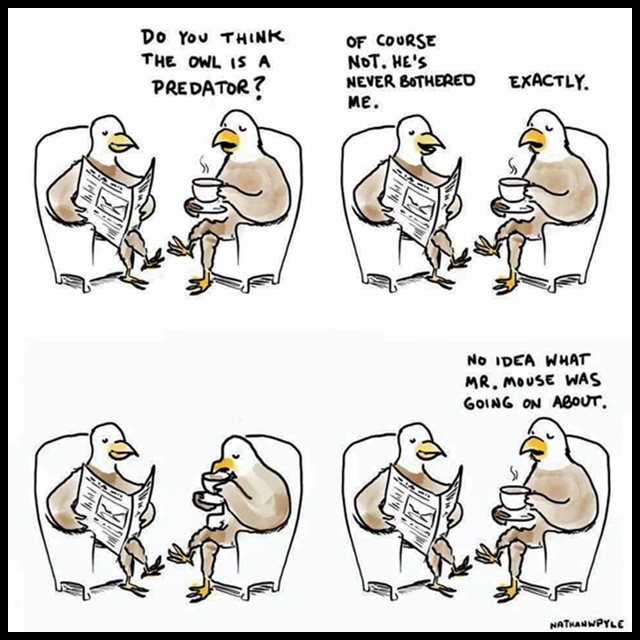
By Jae-Ha Kim
jaehakim.com
September 23, 2017
To the white adoptive parents who are offended when adult adoptees or people of color tell you about some of the negative experiences they have faced growing up: Why don’t you want to hear what needs to be said?
This isn’t about you. You do not know what it is like being treated as an other. You do not know what it’s like to be told to “go back to China!” You do not know what it feels like to be ching chonged when you are already speaking perfect English. And, most of you do not know what it feels like to not know your family history.
You. Do. Not. Know.
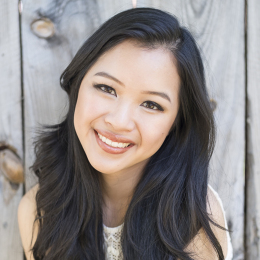 For the past week or so, I have seen Kira Omans’ blog post, Dear Adoption, I Climbed, circulating on my social media feeds. Omans shared some of her heartfelt thoughts about what it meant growing up as a Chinese adoptee in a white community in the United States.
For the past week or so, I have seen Kira Omans’ blog post, Dear Adoption, I Climbed, circulating on my social media feeds. Omans shared some of her heartfelt thoughts about what it meant growing up as a Chinese adoptee in a white community in the United States.
In part, her post read:
I thought that school would be my next adventure, but socially thriving as the only Asian from a middle class family in a sea of rich children who were always given everything they wanted proved a challenge. My parents looked just like their parents, but I didn’t look like anyone. I wanted so desperately to fit in. No matter how hard I tried, I became hyperaware of my differences.
Kids can be cruel.
Kids will announce to the class that you only get good grades because you’re Chinese.
Kids will squint their eyes into slits to “imitate you.”
Kids will butcher an Asian accent to “sound like your ancestors.”
Kids will badger you because you’re not pretty enough.
Kids will stop speaking to you because being your friend makes them uncool.
Kids will imitate your brother’s mannerisms and call him names to make others laugh.
Kids will tie your brother to a fence and hit him because it makes them feel powerful.
Kids will ask why your real parents didn’t want you.
Kids are capable of unimaginable racism and entitlement and violence. Being a kid should not excuse actions that are wrong, and hurtful, and damaging.
Last night, one of my real-life friends shared Omans’ post on Facebook. And several mutual friends asked me privately if I would comment to a question from an adoptive mom, who asked: Why did Omans equate America with whiteness? It was a fair question.
Because all this was posted on a personal page, I won’t share her exact words, but I will relay my reply:
My guess is if it had been a black kid who tied her brother up to a fence, or a hispanic kid who had made fun of the way Asians looked, then she would’ve addressed them in her blog post. But, if her experience was anything like mine, then it was the white kids who made her feel “less than.” You can extrapolate from there that that’s why she felt being white would’ve made her life easier.
That’s not an “insecurity.” That’s a survival mechanism for a child who doesn’t want to get beat up for not being white. I know I felt that way when I was a kid.
I just re-read her blog post and if you read between the lines, her father was high up in his job, which probably meant that she grew up in an affluent area, which probably meant that she went to schools where the enrollment was predominantly white. Heck, my family wasn’t rich, and the schools I went to were almost all white until I got to college. And I grew up in Chicago and lived in D.C. for a while — two of the most diverse cities in the U.S.
Part of what’s going on now in pop culture is that ethnic artists are demanding representation on TV and in films. That’s part of what the whitewashing controversy is about. When I was little, and even when the blogger was young, there was very little Asian representation on television. During my youth, the Asian characters were played by whites (like David Carradine in “Kung Fu”).
And I had hoped that times would change for the better. But as a new mom taking her baby out for a stroll, a rotten little boy told me to go back to China. My then 4-year-old son was called a chink at our pool. And Boy Scouts had no problem making ching chong noises and laughing at me. And yes, they were all white.
The mom replied back that her Korean adoptee daughter doesn’t feel less American than anyone else, but that her two grown, blond sons have been the victims of racial slurs at work.
I have no idea what her sons went through and it’s not my place to doubt her. Nobody was saying this mom was a bad parent. I didn’t go into the differences between prejudice and institutionalized racism, because I didn’t think she would care. I simply responded by saying:
With all due respect, this adoptee shared what her experience was growing up as an Asian adoptee. I’ve shared my experience as to what it was like growing up Asian in a diverse city. And you still don’t seem to get it. You are NOT an adoptee (neither am I!) or Asian (that I am!), and you are talking about how your daughter FEELS. You don’t know how she feels. She is her own person. You know what she chooses to tell you. And children don’t always tell their parents everything. I know I certainly didn’t, mainly because I didn’t want to worry them.
Your white sons should not have to endure slurs at work. I’m grateful that they are probably old enough to handle themselves and hope they deal with it appropriately via human resources.
I wrote a blog post a while ago titled, “Just Because You Didn’t See It, That Doesn’t Mean It Never Happened.” It was culmination of decades of hearing people say that they had an ethnic friend, or they adopted an ethnic child and they never saw any of these horrible things happen. Racists generally don’t reveal themselves when there are people who might put them in their place.
This did not sit well with her. She was offended at my capitalizing (her words, not mine) two words, but refused to acknowledge that her child has life experiences that are independent of hers and that she — as the mother — cannot possibly know what her child feels.
Not too long ago, I fell down and ripped the top layer of skin off my knee. As the wound started to heal, the scab, too, started to fall off. But enough of it was still dangling from my knee to be uncomfortable. To this woman — and others like her — I am that scab. My experiences, words and I are annoying reminders that life isn’t always what you want it to be.
Being white does not mean that your child becomes white by osmosis.
And frankly, if the worst thing that you’ve experienced in life is some “capitalizing,” then you should be grateful.
© 2017 JAE-HA KIM | All Rights Reserved

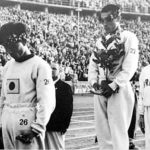

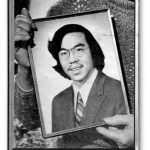
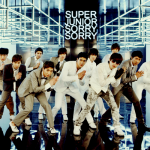
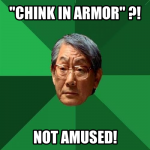
OMG Jae, forgive me for not putting down my name but you’ll know by my email address who I am! 😛 I saw that post on Facebook the other day and that woman is clueless and has no interest in being told what life is like outside of her lilywhite world. Thank you for tryinig to get through to her, for this post, and for all that you do. You are not a scab in my eyes! KEEP ON CAPITALIZING!!! 😂
White women like her are a big part of the problem. They are not our allies. She wishes her daughter to be a certain way and refuses to see outside of her own white little world. This is the type of woman who wants a good Asian baby and would never even think about trying to adopt a black child.
As a white person, I say that this woman is a case of white privilege at its finest. Sorry not sorry but I don’t believe that her two white sons were racially harrrassed at work!
This snowflake was upset that you used a few CAPS but she wasn’t upset that you were abused by racists when you were a child?
I am an adoptive mom to children from Asia. I would never discount the voices of Asians, Asian Americans and especially that of adoptees. I am filled with guilt sometimes about what I cannot provide for my children in terms of likeness. Your answers to this woman were filled with love, understanding, and compassion. Thank you for putting yourself out there.
Powerful analogy. Thank you, Jae.
I would say the same thing applies when raising biracial children. Your kids are not going to be seen as white just because they have one white parent. I talk with both biracial friends and Asian friends to try to understand what my kids may be feeling or going through.
White fragility. White people get defensive when you talk about race because they are under the misguided idea that “color blindness” exists and noticing color makes you racist. My white hubby and I took years of discussion and fighting until he became comfortable talking about race and his privilege. It wasn’t until we adopted that it really hit home.
This is so right on!
Judy, I imagine your husband and I travelled a similar path. Thank you, for defining in writing the struggle.😊
Color blindness does exist. My adopted sister is black, we got her when she was 3 days old. My bff of over 30 years is black. My black sister married a white man. I was even on Oprahs show back in ’86/’87, when I was in high school talking about how we don’t see color.
Like · Reply · Message · about an hour ago
Julie Jackson, only people in a position of privilege can choose to be “color blind.” Color blind doesn’t mean that you love and accept people for who they are. It means that you pretend race isn’t an issue, that it doesn’t affect or influence someone’s lived experience, that being a person of color hasn’t shaped someone’s identity and world view. Of course you love your black family members because you are a decent human being and you see them for who they are. But being color blind means that you “don’t notice race” (which is impossible) and that you are denying those family members have a certain life experience that shapes their identity because of it. We need to recognize and acknowledge color because when we don’t and someone tells you they have a racially motivated experience, you don’t reply, that’s probably not true because it’s not my reality or I didn’t witness it myself. And the idea that we should aim for color blindness was popular in the 80s. It was misguided and hasn’t made anything better.
Thank you, for writing about this subject. My daughter told me, “Mom, you don’t know what it’s like to be a person of color in my school.” The experiences of my husband and children have made me face my privilege, acknowledge it, and grow (hopefully) into a good ally. One of the hardest arguments I get into is with my friends and family who think that we live in a “post-racist” world. I can say that I view the world completely differently because of my husband and kids.
Excellent! Spot on!
Lovely piece of writing, great analogy, and so much truth in this. I am hopeful that each generation of adoptees will have parents who understand that loving us doesn’t make everything ok.
As a blond white man, I can tell you that I have never faced any racial description. Have I been called names? Of course, but they were more like “cracker,” which isn’t racist. It’s just stupid. No one ever was lynched or had a hate crime perputrated against them while being called a “cracker.” I call BS on her complaint that only her two white sons have faced descrimination and not her Asian daughter.